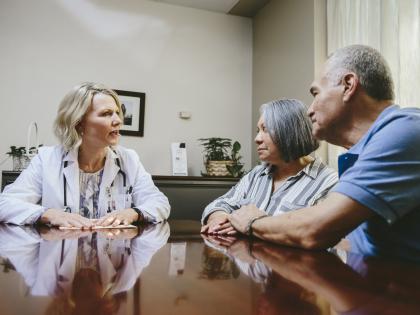Washington State Alzheimer’s Plan Overview

In March 2014, Governor Jay Inslee signed Substitute Senate Bill 6124 (SSB 6124) calling on the Department of Social and Health Services (DSHS) to convene an Alzheimer’s Disease Working Group (ADWG) to develop a Washington State Plan to address Alzheimer’s disease. The working group included professional and unpaid caregivers, people living with Alzheimer's disease, and other health care experts. The Washington State Plan to Address Alzheimer’s Disease and Other Dementias was published in January 2016. Leading the charge to implement the plan is the Dementia Action Collaborative — a group of public-private partners committed to preparing Washington State for the growth of the dementia population.
Washington 2026 Policy Priorities

Incorporate Alzheimer’s Disease in Public Awareness Campaigns
Washington is home to over 126,000 individuals living with Alzheimer’s and many more have multiple risk factors. However, recent research from the Alzheimer’s Association U.S. POINTER Study demonstrates that lifestyle interventions — including healthy nutrition, physical exercise, cognitive engagement, and health monitoring — can significantly support brain health. It is critical that residents across the state understand the importance of brain health, risk reduction strategies and early detection and diagnosis to improve their health and care. The Alzheimer’s Association is calling on state lawmakers to enact legislation that incorporates Alzheimer’s and dementia into existing public health outreach programs to increase public awareness and empower individuals to take charge of their health.

Strengthen Memory Care Standards in Washington
Washington families deserve to know that memory care communities are led by qualified professionals. Following the successful enactment of 2025 legislation — which established a six-hour training requirement for care workers — the State Department of Social and Health Services must now focus on implementation. The Alzheimer’s Association is urging the Department to adopt regulations that define a comprehensive, uniform curriculum for this training. To ensure staff are truly prepared, the regulations must ensure instruction on understanding the disease, person-centered care techniques, assessment and care planning, activities of daily living, and effective communication strategies.

Improve Access to Biomarker Testing
With the historic Food and Drug Administration (FDA) approval of treatments that slow the progression of Alzheimer’s in the early stages, early detection and diagnosis are even more critical to ensure individuals receive the most benefit at the earliest point possible. Biomarkers offer one of the most promising paths to improve dementia detection, diagnosis and treatment. Yet these critical tests remain out of reach for many as insurance coverage is failing to keep pace with innovations and advancements in treatments. The Alzheimer’s Association is urging state lawmakers to expand insurance coverage of comprehensive biomarker testing. Without this legislation, dementia diagnoses may take up to two years, increasing the long-term costs to the individual, family and the state.
Sign Up to Learn About Advocacy Opportunities in Washington

Find My Chapter
Together, we’re making an impact. Find an Alzheimer’s Association chapter in your community for more ways to engage.
Contact Us
State Affairs Contact: Brad Forbes
Phone: 206.529.3867
Email: brforbes@alz.org
126,700
people living with Alzheimer’s in Washington
254,000
Washingtonians are providing unpaid care
$747 Million
Medicaid cost of caring for people living with Alzheimer’s (2025)
3,695
deaths from Alzheimer’s in 2022
20%
in hospice with a primary diagnosis of dementia
68.3%
increase of geriatricians in Washington needed to meet the demand in 2050
Resources to Drive Change in Washington
The following resources developed by AIM and the Alzheimer’s Association will help you learn more about the issues impacting people living with Alzheimer’s and their caregivers, how Washington policymakers are addressing these gaps, and how you can help drive change.